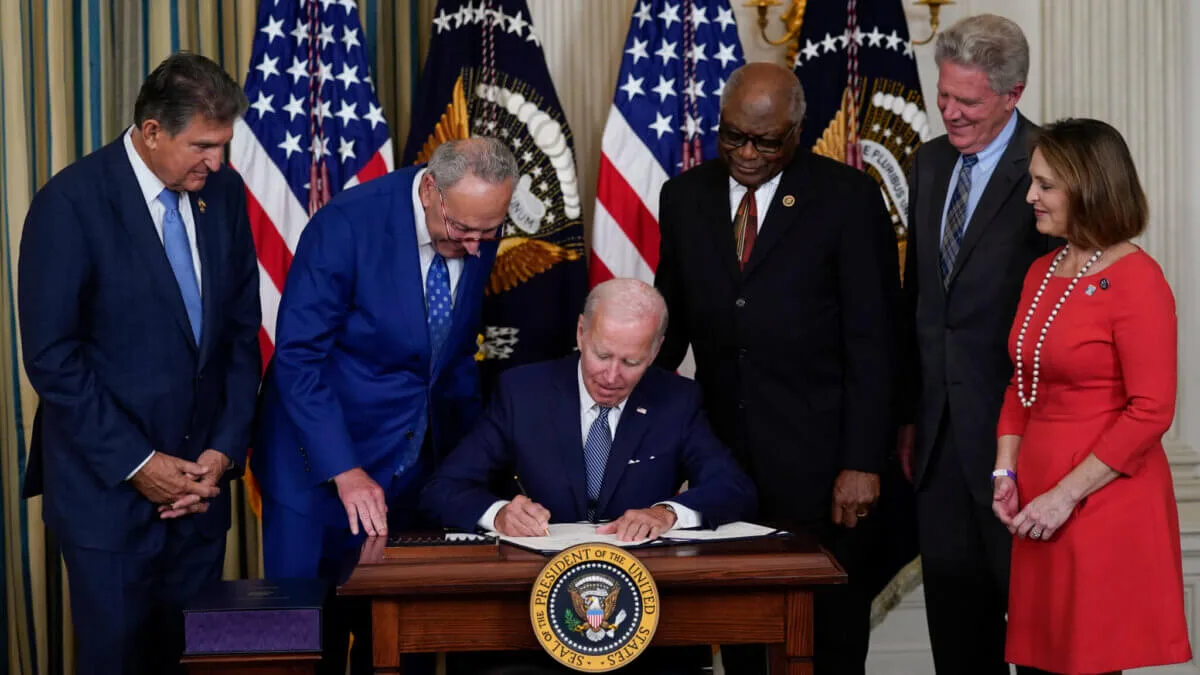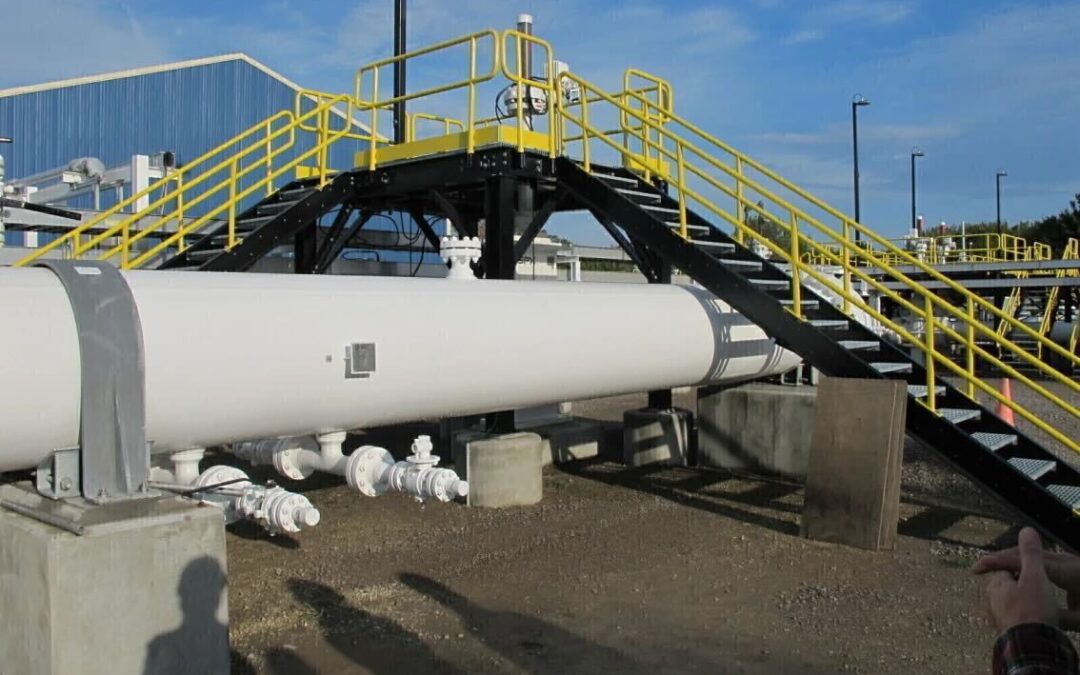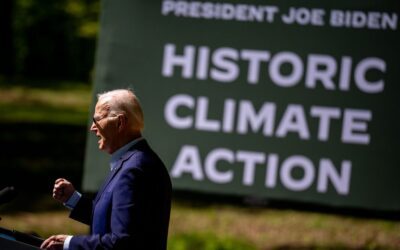
President Joe Biden signs the Inflation Reduction Act, the Democrats' landmark climate change and health care bill in the State Dining Room of the White House in Washington, Tuesday, Aug. 16, 2022, as from left, Sen. Joe Manchin, D-W.Va., Senate Majority Leader Chuck Schumer of N.Y., House Majority Whip Rep. James Clyburn, D-S.C., Rep. Frank Pallone, D-N.J., and Rep. Kathy Castor, D-Fla., watch. (AP Photo/Susan Walsh)
It’s part of President Biden’s legislative agenda—the most productive in generations, yet few Americans know all the details of how it improves their lives, the economy, the climate, and more.
It started with a simple campaign phrase: Build Back Better.
As the presumptive Democratic nominee for president in 2020, Joe Biden first used the expression on July 9, 2020 to describe his vision for the American economy if he were to be elected. It included ambitious job-creating investments in infrastructure, clean energy, and US-based manufacturing; growing the labor force for educators and caregivers; and making taxes and healthcare more affordable for the middle class.
Once he took office, President Biden was able to team with a Democratic-led House and Senate to turn his campaign promises to “Build Back Better” into a legislative agenda. It wasn’t easy—even within his own party—and had to be done in stages. And in its final result “Build Back Better” is almost nowhere to be found in the administration’s case for reelection, the campaign instead choosing to embrace “Bidenomics” to describe a post-pandemic recovery stronger than any other developed country.
Before reviewing the Inflation Reduction Act, let’s differentiate it from the other parts of the Biden agenda.
American Rescue Plan and Bipartisan Infrastructure Act
First came the American Rescue Plan, a pandemic relief bill. With the US economy still reeling from a COVID-19 pandemic that had started 12 months earlier, many households received $1,400 direct payments to help cover mounting bills. There was also $350 billion in aid to state and local governments. In Wisconsin, that included a Main Street Bounceback grant program from Gov. Tony Evers that provided $10,000 to nearly 10,000 small businesses.
There was a proposed American Jobs Plan that later became the Bipartisan Infrastructure Law, with around $7 billion in jobs and improvements scheduled for Wisconsin. And an American Families Plan was going to create paid family leave and provide assistance on child care, health care, and education costs.
But Biden ran into a roadblock: Democrats’ thin margins gave them no votes to spare and Sen. Joe Manchin of West Virginia demanded changes. (Manchin now labels himself an independent and is retiring from Congress after this year.) Manchin is single-handedly responsible for having the paid family leave provision removed from consideration. A proposed extension of a larger Child Tax Credit had to be dropped. And Manchin demanded scaling back some of the energy provisions, claiming they would harm jobs in coal and other fossil fuel industries. Build Back Better was considered dead and Biden’s political capital exhausted.
But negotiations behind the scenes involving Biden, Manchin, and other Senate Democrats led to the July 2022 announcement of a new bill: the Inflation Reduction Act (IRA). While Biden had to make concessions to get there, the resulting law—passed with no Republican votes—still resulted in historic investments in clean energy, groundbreaking tax reform, and significant reductions in healthcare costs.
What’s in the Inflation Reduction Act?
The IRA reduces the federal budget deficit by allowing Medicare to negotiate for bulk pricing with drug companies. This may sound like common sense, but Republicans for 20 years had blocked this ability to save money for taxpayers—savings estimated at $281 billion over a ten-year period.
The deficit is also addressed by establishing a minimum corporate tax for companies with annual incomes of more than $1 billion. Closing corporate loopholes will save taxpayers $222 billion, plus another $181 billion in new revenue by giving the Internal Revenue Service more resources to go after wealthy tax cheats and improve customer service.
The IRA allowed the continuation of the expanded Affordable Care Act subsidies for healthcare plans, first provided under the American Rescue Plan.
Health care costs for Medicare recipients were helped by capping insulin prices at $35. (Republicans blocked efforts to cap insulin costs for all Americans.)
And the IRA makes generational investments in clean energy and measures designed to address an undeniably changing climate.
The IRA’s Energy and Climate Benefits
The biggest part of the Inflation Reduction Act is its investment in energy and climate related jobs, manufacturing, installation, and household support for energy efficiency. Like the Bipartisan Infrastructure Law, it’s a plan to build the economy of the future, rather than kick the can (and higher bills) to the next generation.
One program, the Home Efficiency Rebates Program also known as HOMES, is designed for whole-home efficiency—things like new windows, heat pumps, solar panels, and other improvements that lead to lower utility bills once completed. The IRA helps with the up-front costs that are otherwise a short-term obstacle to long-term savings.
Another program, Home Electrification and Appliance Rebates also known as HEAR, focuses financial help on low and moderate-income families looking to add electric appliances like a stove and oven, new electric panels, ventilation, and more.
All told, these IRA provisions will spend nearly $9 billion over 10 years in financing and tax credits for homeowners, renters, and landlords to make energy efficient changes. Those upgrades are forecast to save Americans $1 billion a year in reduced energy bills, meaning the new law pays for itself within the decade.
Too Many Benefits to Remember?
Biden faces a campaign challenge unheard of in recent times—getting so much done that the public hasn’t fully absorbed its impact. Polling indicates Americans agree with him on a variety of issues, but they give low marks for any awareness of Biden saying “a lot” about his individual accomplishments. For example, 89 percent say they support “reducing the deficit,” but only 15 percent say they have heard a lot about this from the president. (Data for Progress poll of 1,221 likely voters on March 1-2, 2024.)
National campaign coverage shows Biden and Democrats spending far more time pointing to former President Donald Trump’s divisive rhetoric and dangerous plans if voters were to give him another chance. Talk about Biden’s policies has come from a steady parade of surrogates who have come to Wisconsin to talk up everything from workforce training to lead pipe removal to clean energy manufacturing to all the new road and bridge projects.
One of the big questions for November 5 is whether voters by then will make the connection between Biden, the Inflation Reduction Act, and its benefits that will be years in the making.
Support Our Cause
Thank you for taking the time to read our work. Before you go, we hope you'll consider supporting our values-driven journalism, which has always strived to make clear what's really at stake for Wisconsinites and our future.
Since day one, our goal here at UpNorthNews has always been to empower people across the state with fact-based news and information. We believe that when people are armed with knowledge about what's happening in their local, state, and federal governments—including who is working on their behalf and who is actively trying to block efforts aimed at improving the daily lives of Wisconsin families—they will be inspired to become civically engaged.


Enbridge pipeline spills 70,000 gallons of oil in Wisconsin
OAKLAND, Wis. (AP) — Roughly 70,000 gallons (264,978 litres) of oil from a pipeline spilled into the ground in Wisconsin, officials said. The...

Wisconsin agency issues first round of permits for Enbridge Line 5 reroute around reservation
MADISON, Wis. (AP) — Enbridge’s contentious plan to reroute an aging pipeline around a northern Wisconsin tribal reservation moved closer to reality...

Here’s how to lower your home’s energy bill under the Inflation Reduction Act
It begins with assessing your home’s current energy use, planning improvements, then getting connected to the credits and rebates that can create...

Wisconsinites need to know how they can benefit from Biden’s clean energy efforts. Mandela Barnes is on it.
The one-time head of the governor’s climate change task force now helps connect Wisconsinites to historic levels of funding for energy efficiency...





